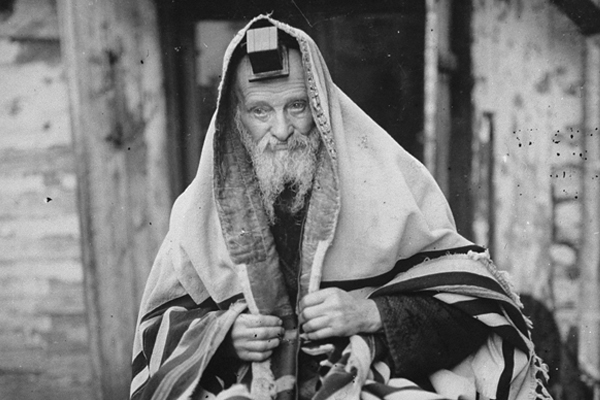
Rabbi Yechiel Teitelbaum, the old Rabbi of Kolbuszowa, forced to pose for a photograph in his tallit and tefillin (prayer shawl and phylacteries) in front of his home in the ghetto. United States Holocaust Memorial Museum, courtesy of Norman Salsitz
2024 J. B. and Maurice C. Shapiro Annual Lecture
Orthodox Jews suffered greatly during the Holocaust, yet their experiences have been inadequately studied by scholars. By examining diverse sources—including diaries, memoirs, letters, and photographs—we can shed light on previously unknown aspects of Orthodox Jewish life during the Holocaust. Moreover, by exploring themes—such as the early days of occupation, leadership dynamics, the experiences of Jewish youth, responses to adversity, and rescue efforts—we can advance the field of Holocaust studies as a whole.
Join us in person or virtually for this program exploring new research into the experiences of Orthodox Jews in German-occupied Poland and its impact on Holocaust studies.
Opening Remarks
Dr. Lisa Leff, Director, Jack, Joseph and Morton Mandel Center for Advanced Holocaust Studies, United States Holocaust Memorial Museum
Speaker
Dr. Havi Dreifuss, Professor of History, Department of Jewish History, Tel Aviv University
Moderator
Dr. Elizabeth Anthony, Director, Visiting Scholar Programs, United States Holocaust Memorial Museum
This program is free and open to the public, but registration is required. The in-person program will be followed by a dessert reception in the Hall of Witness. If you wish to view the program virtually, you will receive a YouTube link upon registration.
For more information, please contact calendar@ushmm.org.
The J. B. and Maurice C. Shapiro Senior Scholar-in-Residence Fellowship, endowed by the J. B. and Maurice C. Shapiro Charitable Trust, enables the Mandel Center to bring a distinguished scholar to the Museum each year to conduct innovative research about the Holocaust and disseminate this work to the public. The scholar in residence also leads seminars, lectures at universities in the United States, and serves as a resource for the Museum, educators, students, and the general public.
The Jack, Joseph and Morton Mandel Center’s mission is to ensure the long-term growth and vitality of Holocaust studies. To do that, it is essential to provide opportunities for new generations of scholars. The vitality and the integrity of Holocaust studies require openness, independence, and free inquiry so that new ideas are generated and tested through peer review and public debate. The opinions of scholars expressed before, during the course of, or after their activities with the Mandel Center do not represent and are not endorsed by the Museum or its Mandel Center.
